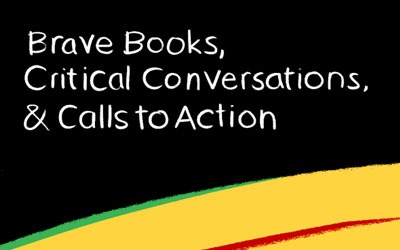Teaching for Black Lives
By Laura Benson, ISS Director of Curriculum and Professional Development
As many of our colleagues immerse students in Black History Month studies this February and continue antiracism work in school communities around the world, we wanted to let you know of ongoing efforts to offer you learning, teaching and professional resources in our ISS Antiracism Padlet. You will find a column/shelf titled Black History Month as well as numerous other lenses for these vital collaborations and journeys.
I also share some powerful insights I recently gained from my reading of Teaching for Black Lives in a book club and think tank co-facilitated by our brilliant and generous ISS colleague Adrienne Waller from Cayman International School.
While each of us and our communities are in unique growing places — and while some of the following recommendations need specific and responsive cultural considerations for our school contexts and missions — I offer below these ideas in friendship, hope, and invitation for us to collectively work together to sustain antiracism and inclusion for all.
Selected thoughts from Teaching for Black Lives
Quote (page 20)
“#BlackLivesMatter doesn’t mean your life isn’t important – it means that Black lives, which are seen as without value within white supremacy, are important to liberation.”
How to Make Black Lives Matter in Our Schools (page 21)
- Provide a social justice, anti-racist curriculum that gives students the historical grounding, literacy skills, and space to explore the emotional intensity of feeling around the murder of Black youth. At the same time, deep discussion of heavy issues needs to build on strong classroom community. Students can’t launch into discussions of racism without a basis of trust and sharing among students and between students and teacher/s. That is the slow, steady work of meaningful classroom conversation, purpose group work, reading and writing about critical social and personal issues, shared writing, and more. Teachers need to nurture communities of mutual respect and empathy.
- Support students who want to have conversations about the Black Lives Matter movement outside the classroom, in school forums or school clubs. Educators supporting the word of Black Student Unions in schools across the country (and world) have helped transform the school climate. Black students’ sense of pride and self-worth have helped ignite this new civil rights movement.
- Raise the Black Lives Matter movement with other teachers at our schools and in our unions. It’s not enough to provide students with historical lessons. History is being made today by teachers planning Black Student Lives Matter forums, advocating for hiring more Black teachers, and participating in many other actions around the country (and world). *Co-create these efforts with students, not just for them, too.
Additional Guides (page 25)
- Support ethnic studies in all schools
- Replace zero-tolerance discipline with restorative justice practices
- De-track classes within the school to undo racial segregation that is reinforced by tracking.
Six-Point Program to Confront Injustice (pages 34-35)
- Equality for all regardless of race, gender, class, social standing and/or sexual orientation – both in and out of the classroom as well as the community
- Increase of unity within the community.
- Academic equity for students.
- Provide (edifying) and adequate (professional learning) for teachers, staff and administrators to effectively interact with students (and offer them respectful and informative feedback)
- Oppose segregation through classism
- Getting others to see that institutional racism does exist in our community, city, state/country, and world.
I leave you with a quote from Michelle Obama:
“I can’t make people not afraid of black people. I don’t know what’s going on. I can’t explain what’s happening in your head. But maybe if I show up every day as a human, a good human, doing wonderful things, loving my family, loving your kids, taking care of things that I care about—maybe, just maybe that work will pick away at the scabs of your discrimination. Maybe that slowly will unravel it. That’s all we have, because we can’t do it for them, because they’re broken. Their brokenness in how they see us is a reflection of this brokenness. And you can’t fix that. All you can do is the work.”







